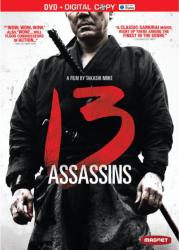 |
|

|
Japanese director Takashi Miike is one of those filmmakers whose career is tough to encapsulate: from the shocker Audition to the gory manga adaptation Ichi the Killer to the Japanese spaghetti western Sukiyaki Western Django to... well, suffice to say he will not be pinned down to a specific genre. Yet it is somehow a surprise that he tackled chanbara, the period samurai movie. In the 1840's, nearing the end of Shogunate rule, Japan has entered a lengthy period of peace, rendering the samurai warrior class all but useless. The snake in this particular garden is Lord Naritsugu, the up-and-coming half-brother to the Shogun. He gives sadistic brutes a bad name; in fact, there is a very good chance that today Naritsugu would be recognized as a psychopath, routinely, almost emotionlessly, raping, killing and maiming his charges. One clan chief commits harakiri in protest, leaving Sir Doi, the Lord in charge of justice in the land, a prickly problem: Naritsugu must be dealt with, but to do so openly would dishonor the Shogun. The solution: charge it to a samurai of known honor, Shinzaemon Shimada, who can assassinate the rogue Lord while giving the Shogun's council plausible deniability. Shimada is grateful for the task, a chance to die a glorious and noble death, the desire of all samurai, but nearly impossible in this time of peace. Shimada manages to find 12 men of similar desire, and they embark on a daring, risky plan: during Naritsugu's annual trip from the capitol to his home, the group manages to split his entourage, causing the evil Lord's portion of his retinue to pass through a village which Shimada's men have transformed into an elaborate deathtrap. Unfortunately for Shimada, an old classmate is Naritsugu's right hand man. He sees through the plan and arrives with reinforcements - and the 13 assassins wind up facing a small army of over 200 men. It would be easy to pass 13 Assassins off as Miike's attempt to play at Kurosawa - some of the scenes have a resonance that suggests Seven Samurai - but that would be lazy indeed. Unlike the earlier movie, Assassins eventually becomes a rumination on the very nature of the samurai class, and the changing face of bushido. Shimada's old classmate, Hanbei, feels it is his duty to lay down his life for a Lord he personally despises and fears; Shimada, on the other hand, is willing to die to protect the people and future of Japan. Also, in case you haven't heard: that final battle scene clocks in at almost 40 minutes. Holy. Cow.
This a beautiful transfer of a movie rich in detail. It seems rather dark in places, but it also seems Miike was going for as much natural lighting as possible. Menus are spare and static, basically an animated gif of a group shot - very effective. The audio landscape is lively, and the English dub - usually not my favorite way to watch a foreign movie - is exceptionally well-done.
The disc starts with trailers for other Magnet Releasing movies - Hobo With A Shotgun, Rubber, Troll Hunter, The Perfect Host and, to be expected, a commercial for HDnet. There are 18 minutes of Deleted Scenes - most of which are more like deleted lines, but there are a couple of entire scenes whose exclusion does no real damage to the movie. This leads to a 19-minute Interview with Takashi Miike, undertaken by a perky TV girl - all subtitled, of course. The interviewer seems to think the various deaths of the assassins during the final battle were "cool", which Miike, appropriately, dismisses, and you can see a bit of the man's sly humor when he describes the movie as "a family film". There is also a theatrical trailer for 13 Assassins, which is wonderful, as too many discs leave out what I feel is a very important part of a movie's identity: its marketing. The rest of the disc is taken up by the Digital Copy. As said earlier, it would be easy to dismiss this as Miike doing his take on Kurosawa. That would be a mistake. This is the work of a mature artist, a serious movie that deserves to be taken seriously. Dr. Freex, 7/17/2011 |
|
|
|
|
|
|


